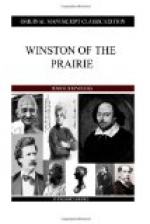Then Courthorne turned to Barrington. “I sympathize with you, sir,” he said. “This must be horribly mortifying, but, you see, Winston once stopped my horse backing over a bridge into a gully when just to hold his hand would have rid him of me. You will not grudge me the one good turn I have probably done any man, when I shall assuredly not have the chance of doing another.”
Barrington winced a little, for he recognized the irony in the failing voice, but he rose and moved towards the bed.
“Lance,” he said, a trifle hoarsely, “it is not that which makes what has happened horrible to me, and I am only glad that you have righted this man. Your father had many claims on me, and things might have gone differently if, when you came out to Canada, I had done my duty by his son.”
Courthorne smiled a little, but without bitterness. “It would have made no difference, sir, and, after all, I led the life that suited me. By and by you will be grateful to me. I sent you a man who will bring prosperity to Silverdale.”
Then he turned to Stimson, and his voice sank almost beyond hearing as he said, “Sergeant, remember, Winston fancied I was dead.”
He moved his head a trifle, and the doctor stooping over him signed to the rest, who went out except Barrington.
It was some hours later, and very cold, when Barrington came softly into the room where Dane lay half-asleep in a big chair. The latter glanced at him with a question in his eyes, and the Colonel nodded very gravely.
“Yes,” he said. “He has slipped out of the troopers’ hands and beyond our reproaches—but I think the last thing he did will count for a little.”
CHAPTER XXVI
WINSTON RIDES AWAY
The first of the snow was driving across the prairie before a bitter wind, when Maud Barrington stood by a window of the Grange looking out into the night. The double casements rattled, the curtains behind her moved with the icy draughts, until, growing weary of watching the white flakes whirl past, she drew them to and walked slowly towards a mirror. Then a faint tinge of pink crept into her cheek, and a softness that became her into her eyes. They, however, grew critical as she smoothed back a tress of lustrous hair a trifle from her forehead, straightened the laces at neck and wrist, and shook into more flowing lines the long black dress. Maud Barrington was not unduly vain, but it was some time before she seemed contented, and one would have surmised that she desired to appear her best that night.
The result was beyond cavil in its artistic simplicity, for the girl, knowing the significance that trifles have at times, had laid aside every adornment that might hint at wealth, and the somber draperies alone emphasized the polished whiteness of her face and neck. Still, and she did not know whether she was pleased or otherwise at this, the mirror had shown the stamp which revealed itself even in passive pose and poise of head. It was her birthright, and would not be disguised.




